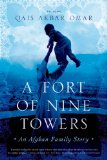Summary | Excerpt | Reviews | Beyond the Book | Readalikes | Genres & Themes | Author Bio

An Afghan Family Story
by Qais Akbar Omar
The women made a separate circle to talk about their own things. It was the responsibility of the older women to find good husbands for the younger ones, such as my father's two unmarried sisters, who lived with us. His two older sisters were already married, and had moved away to the homes of their husbands' families in other parts of Kabul. Discussions on suitors could go on for months and involve the whole family until a choice was made.
My cousins and I sat in another circle, boys and girls together, telling one another scary tales, and staring at Kabul's clear night sky with the moon and stars scattered across it. When we got tired of stories, we shaped animals from the stars and laughed.
Sometimes after we had finished eating, my father or one of my uncles would take the kids around the mountain to buy us ice cream at Shahr-e-Naw Park, or to one of the Kabul movie theaters for an Indian or American film.
* * *
Kabul was like a huge garden then. Trees lined the wide streets and touched each other overhead in tall, leafy arches. The city was full of well-tended parks, in which tall pink hollyhocks competed for attention with bright orange marigolds and hundreds of shades of roses. Every house had a garden with pomegranate, almond, or apricot trees. Even the mountain with the two peaks was covered in low-growing weeds and grasses that came to life with the spring rains. In both spring and fall, the sky filled with the brightly colored water birds that rested in the wetlands around the city as they flew between the Russian steppes and India. Ancient underground channels brought water from the mountains, and kept our gardens green.
* * *
Every Friday, the Muslim holy day when schools and businesses closed, we carried a large lunch to one of the gardens of our neighbors, or to picnic spots nearby at Qargha Lake or in the Paghman Valley, or sometimes even as far as the Salang Pass, high in the mountains of the Hindu Kush an hour's drive north of Kabul. This was a day for extended families to spend together, visiting and joking and gossiping.
My cousins and I climbed hills, while the elders reclined against huge pillows in the shade of willow trees or under the broad leafy branches of a panj chinar tree. My unmarried aunts were kept busy boiling water for the others who drank one cup of tea after another. In these long afternoons they took turns spinning some small event into a big story that made everybody laugh. They all tried to outdo one another, of course. They are Afghans. Of them all, my mother was the best.
My uncles were tabla drummers, and my father played the wooden flute, though he had never had lessons. We stayed until late into the evenings, singing, dancing, and cooking over an open fire.
Sometimes on these outings, the cousins held a school lessons competition. Whoever got the highest score could demand that the other cousins buy whatever he or she liked, no matter the cost. We, too, were very competitive. Our parents were the judges, and cheered loudly every time one of us got a correct answer. Sometimes the competition ended in a tie. We hated that.
Occasionally, some of the cousins fought and did not talk to each other for a day or two. But we could not maintain that for very long. Our games were more important, and never ended, whether we were playing hide-and-seek in the garden, or shooting marbles, or racing our bicycles in the park near our house, or especially when we were flying kites from the roof.
Every afternoon in the spring and autumn, when the weather brought a gentle breeze, hundreds of kites would fill the sky above Kabul and stay there until dark. Kite flying was more than a game; it was a matter of the greatest personal pride to cut the string of your rival's kite. The trick was to draw your kite string against your opponent's with speed and force, and slice through his string.
Copyright © 2013 by Qais Akbar Omar
Your guide toexceptional books
BookBrowse seeks out and recommends the best in contemporary fiction and nonfiction—books that not only engage and entertain but also deepen our understanding of ourselves and the world around us.